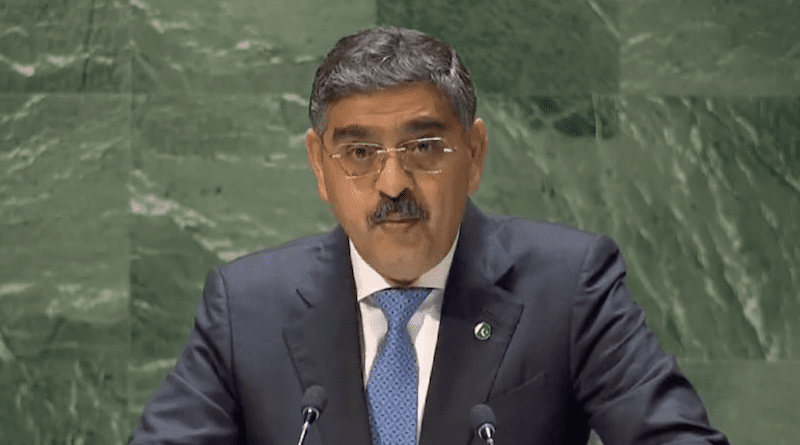Pakistan At UNGA: Urges Responsibility And Constraints Of Nationhood – OpEd
By Shaimin Raja
Caretaker Prime Minister Anwaar-ul-Haq Karkar of Pakistan recently concluded a five-day visit to New York, where he delivered a significant address at the 78th Session of the United Nations General Assembly. This visit not only marked a historic moment for Pakistan but also drew immense interest among world leaders and governments’ representatives. It provided a platform for Prime Minister Karkar to convey Pakistan’s views on key regional and global issues, including India’s actions, extremism, and human rights violations in the region.
During his address at the UN General Assembly, Prime Minister Karkar articulated Pakistan’s stance on various pressing matters, shedding light on the challenges faced by the region and the world at large. His speech covered a wide array of topics, reflecting Pakistan’s perspective on issues that are not only of regional importance but also have global implications. One of the focal points of PM Karkar’s address was his concern about what he referred to as “India’s rogue behavior.” He underscored Pakistan’s persistent stance on the alarming rise of extremists within the RSS-inspired BJP government in India. According to the Prime Minister, these religious fanatics are not only persecuting minorities in India but also fueling a growing Hindu supremacist trend that poses a threat to regional and global peace.
He did not shy away from addressing the longstanding issue of human rights violations in the Indian Illegally Occupied Jammu and Kashmir (IIOJK). He called upon the international community to take notice of India’s ongoing human rights abuses in the region. This has been a contentious issue for years, and Pakistan continues to advocate for a resolution that ensures the rights and aspirations of the Kashmiri people. The Prime Minister emphasized the need for global cooperation in countering terrorism. He highlighted the threat posed by extremist ideologies and underscored the importance of addressing these issues collectively. Pakistan has faced its share of challenges in combating terrorism and understands the significance of international collaboration in this regard.
In his address, Prime Minister Karkar raised concerns about financial inequality and the economic impact of the COVID-19 pandemic. He stressed the importance of addressing these issues to ensure a more equitable global economic system. Moreover, he pointed out the challenges posed by inflation, which has been exacerbated by the pandemic, and called for strategies to mitigate its effects. The caretaker Prime Minister also discussed the pressing issue of climate change. He urged developed nations to provide financial and technical support to developing countries like Pakistan to help them achieve their climate change goals. This is a critical issue, as countries worldwide grapple with the effects of climate change, from extreme weather events to rising sea levels. PM Karkar expressed Pakistan’s commitment to promoting peace and stability in Afghanistan. Given Pakistan’s geographical proximity and historical ties with Afghanistan, the country has a vested interest in ensuring that the region remains peaceful and secure.
In addition to his address at the UN General Assembly, Prime Minister Karkar engaged in crucial meetings with several world leaders and representatives during his visit to New York. These meetings provided an opportunity to strengthen diplomatic ties and discuss important regional and bilateral issues. Prime Minister Karkar reaffirmed Pakistan’s commitment to deepening its ties with Iran. This relationship has strategic importance, particularly regarding regional stability and economic cooperation.
The Prime Minister held discussions with Chinese Vice President Han Zheng, emphasizing their joint commitment to the China-Pakistan Economic Corridor (CPEC). This massive infrastructure project has the potential to transform the region’s economic landscape. During a meeting with President of Uzbekistan Shavkat Mirziyoyev, PM focused on promoting regional economic integration. Both leaders pledged to play an active role in enhancing inter-regional connectivity. He also briefed UN Secretary-General Antonio Guterres on India’s human rights violations in the IIOJK. This highlights Pakistan’s determination to bring international attention to this longstanding issue. In a meeting with IMF Managing Director Kristalina Georgieva, Prime Minister Karkar discussed measures taken by Pakistan to stabilize and revive its economy. Pakistan’s economic stability is crucial for regional and global financial stability. Moreover, PM Karkar addressed a high-level dialogue on the Global Development Initiative and stressed the need for adequate financing to achieve Sustainable Development Goals (SDGs). Pakistan’s support for China’s GDI underscores its commitment to addressing poverty, food security, and climate change.
Prime Minister Anwaar-ul-Haq Karkar’s visit to New York and his address at the 78th UN General Assembly were significant milestones for Pakistan on the global stage. His forthright viewpoints on issues such as India’s behavior, human rights violations in Kashmir, extremism, and climate change have drawn attention and sparked important discussions. Moreover, his meetings with world leaders underscore Pakistan’s commitment to regional stability, economic cooperation, and addressing global challenges collectively. As Pakistan navigates complex regional dynamics and contributes to global discussions, the world will be watching closely to see how these diplomatic efforts shape the future of the region and the world.


Nothing new. Age old rambling to deflect attention from gross mismanagement of the country.